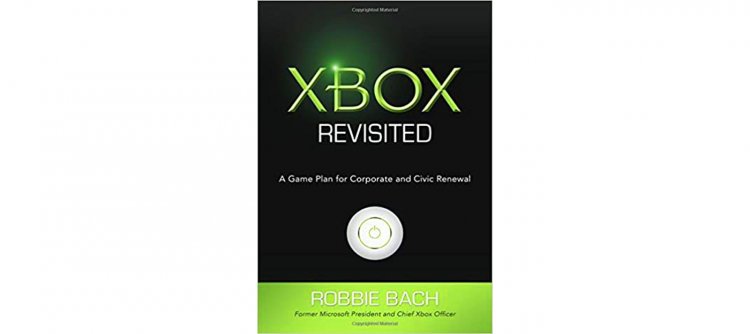The Xbox Rules: Lessons Learned as the CXO
Robbie Bach, Author, Xbox Revisited: A Game Plan for Corporate and Civic Renewal

When I am introduced as Microsoft’s original Chief Xbox Officer (or CXO), I get all kinds of reactions ranging from “Wow, what a great opportunity” to “Can I have your autograph for my son?” The Xbox saga was a challenging journey in many ways, and when I decided to write a book about the experience, I quickly realized how much I learned and how much I grew as a leader during the sojourn. Distance has a great way of bringing important insights. The result of all of this reflection, Xbox Revisited: A Game Plan for Corporate and Civic Renewal, takes the lessons from my time as CXO and applies them to both corporate and civic challenges. So whether you are a CEO of a for profit business, the Executive Director of a non-profit organization, the head of a government agency, or an individual looking to improve, there are some important truths to take from the trials, challenges, and triumphs of the Xbox team.
- Simplicity Wins: I am a firm believer that tackling complex problems requires incredible simplicity. As the Xbox leader, I tried to dive into our challenges, wrestle with the problems in detail, and find some magical solutions. Experience taught me that this first instinct is a mistake – instead, leaders need to step away from the problem, understand a few concrete actions in which they can focus the team, and pursue those aggressively. With each small step forward, the complexity will unravel itself, much as a knot does when you strategically pull on the right parts of the string.
- Culture is Everything: Everyone knows that having great people is important to success, but I would argue that this is a necessary, but not sufficient, criteria for winning. The original Xbox team was a collection of incredibly bright people, committed to their work, and as skilled as any team with which I’ve worked. And yet, we struggled mightily individually and as a team until we took the time to establish a healthier, common culture that guided our work. The first Xbox team was like running the United Nations – with an improved culture came the success that only a united nation can achieve.
- All About the eXperience: We developed a concept during our Xbox work called BXT which stood for Business, eXperience, and Technology. While our eventual success involved some great Business work and leveraged amazing Technologies, it ultimately was the customer eXperience, including things like Xbox Live, which mattered most. Whenever we did things that focused on putting smiles on our customer’s faces, we were rewarded regardless of the technical plumbing or business principles in the background. Apple is a strong technology company run by smart business people – but they win in the market because of the Apple eXperience.
- Find the North Star: The first version of Xbox lacked a cohesive strategy to mobilize and unify the team. In fact, if you had asked various parts of the group to define our ultimate goal, you would have gotten many different responses. Once we united ourselves around a strategy process called the 3P Framework, we understood our north star in a clear way and drove to it successfully as a team. Xbox Revisited recounts how establishing Purpose, defining Principles, and setting Priorities in a three page document can revitalize businesses and our civic institutions.
- The Innovation Portfolio: In many respects, Xbox was about figuring out how to innovate from within a large company, and the team had to buck several of the approaches that made Microsoft successful. We learned the power of betting on innovations in a number of areas like social networking, silicon technologies, and creative storytelling that were beyond Microsoft’s existing sweet spots. Not all of these bets turned out well, but because we had a portfolio of well thought-out investments (much like a VC would), the net result was overwhelmingly positive.
My new title in life after Microsoft is “Civic Engineer,” and I’m focused on using these same business concepts to help our community organizations and institutions find better solutions to today’s complex problems. While the corporate and civic worlds are not “the same,” imagine what we could accomplish and how we could improve our communities if we applied these lessons beyond our professional lives. That would be a civic innovation worth celebrating.
About the Author
Robbie Bach joined Microsoft in 1988 and over the next twenty-two years worked in various marketing, general management, and business leadership roles, including working on the successful launch and expansion of Microsoft Office. As Chief Xbox Officer, he led the creation and development of the Xbox business, including the launch of the Xbox and the highly popular successor product, Xbox 360. He retired from Microsoft in 2010 as the President of the Entertainment and Devices Division. In his new role as civic engineer, Robbie currently serves on the national board of governors for the Boys and Girls Clubs of America and was the chairman of the board from 2009-2010. He is also a board member of the United States Olympic Committee, Sonos Inc., Brooks Running Company, the Space Needle Inc., and local chapters of Boys and Girls Clubs and Year Up. Robbie is a regular guest lecturer at universities across the country and frequently writes on business and civic issues. All profits from his writing and speaking activities are donated to charity. He currently resides in Medina, Washington. To learn more, please visit: www.RobbieBach.com.

















